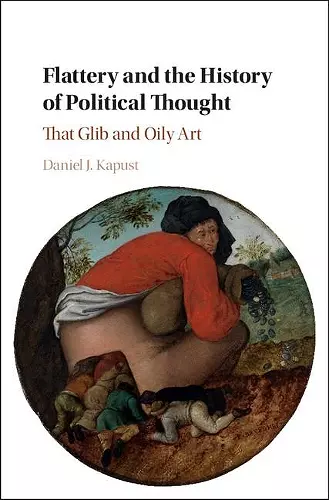Flattery and the History of Political Thought
That Glib and Oily Art
Format:Hardback
Publisher:Cambridge University Press
Published:25th Jan '18
Currently unavailable, and unfortunately no date known when it will be back

Demonstrates flattery's importance for political theory, addressing representation, republicanism, and rhetoric through classical, early modern, and eighteenth-century thought.
This book focuses on a key topic in the history of political thought: flattery. Enriching contemporary discussions of rhetoric, democratic theory, republicanism, and representation, it discusses Cicero, Pliny, Castiglione, Hobbes, Mandeville, Smith, and the Federalist Papers, while engaging scholarship from classics, political theory, history, and rhetoric.Flattery is an often overlooked political phenomenon, even though it has interested thinkers from classical Athens to eighteenth-century America. Drawing a distinction between moralistic and strategic flattery, this book offers new interpretations of a range of texts from the history of political thought. Discussing Cicero, Pliny, Castiglione, Machiavelli, Hobbes, Mandeville, Smith, and the Federalist/Anti-Federalist debates, the book engages and enriches contemporary political theory debates about rhetoric, republicanism, and democratic theory, among other topics. Flattery and the History of Political Thought shows both the historical importance and continued relevance of flattery for political theory. Additionally, the study is interdisciplinary in both subject and approach, engaging classics, literature, rhetoric, and history scholarship; it aims to bring a range of disciplines into conversation with each other as it explores a neglected - and yet important - topic.
'Kapust's tour de force, lucid and well-argued throughout, demonstrates the significance of 'flattery' - a concept that is paid insufficient attention by contemporary political theorists. Flattery and the History of Political Thought exemplifies political theory at its best: it is faithful to the arguments and historical contexts of the political thinkers examined; and it also points up the relevance of 'flattery' for politics today, such as the deleterious effects of manipulation and insincerity - often concomitants of flattery - on democratic discourse and representation.' Gary Remer, Professor of Political Science, Tulane University, New Orleans
'Kapust's remarkable book highlights modes of power-seeking and influence that were considered eternally problematic in the history of political thought - potentially dangerous modes that we have for too long neglected at our own peril. Kapust's penetrating analysis of flattery provides the grounds for reforming democracy in a pragmatic, realistic, and yet still normatively substantive way. Flattery and the History of Political Thought: That Glib and Oily Art is an invaluable contribution to contemporary trends in civic realism; a timely book that theorizes power and justice in ways that are indispensable for healthy democratic politics today.' John P. McCormick, University of Chicago
'At a moment when democracies are struggling mightily with questions of leadership, trust, and demagoguery, Kapust's Flattery and the History of Political Thought offers an impressive theoretical and historical account. Kapust carefully disentangles the power relations surrounding different forms of the phenomenon and highlights the critical importance of context when it comes to passing judgment on that 'glib and oily art'. Moreover, his work offers richly detailed insights into multiple historical periods, from ancient Rome to Renaissance Europe to eighteenth-century England and the US. In doing so, he has produced a work that will speak to anyone interested in the relationship between speech and political power, whether from a historical perspective or at this very moment.' Elizabeth Markovits, Mount Holyoke College, and author of The Politics of Sincerity
ISBN: 9781107043367
Dimensions: 235mm x 156mm x 18mm
Weight: 450g
238 pages